
The novel coronavirus pandemic has shaken the world a great deal. Due to the virus, people have been laid off, businesses shut down, and almost all countries are experiencing a total or partial lockdown. The economy is severely affected, and as a result, the average employee, business owners, and employers are all worried about their finances and the security of their loved ones. With such circumstances, people are finding it challenging to balance between their sleep and stress amidst pandemic.
Below are five carefully analyzed tips that will help you handle the delicate balance of sleep and stress amidst pandemic and, consequently, ensure that you get a goodnight’s sleep during the COVID-19 epidemic.
1. Organize your Routine and Schedule in advance
To have a goodnight’s sleep during this COVID-19 pandemic, you need to facilitate a sense of normalcy and establish a routine. A consistent sleep schedule is healthy for your body, and that is why health professionals recommend minimal variations in your daily sleep routine. Minimal changes make it easier for your body to acclimate to the schedule and allows you to fall asleep faster when you are supposed to. This is especially important during this global pandemic, which has seen a significant rise in stress levels among people.
Most people do not have a definitive routine to follow during this lockdown period. Activities have become monotonous, and a good number are spending time indoors, on the couch, or in bed. The new normal has disrupted previous work schedules and made it harder for people to stick to a reasonable plan. To organize yourself for proper sleep, you need to set strict wake-up time, wind-down time, and bedtime. Sticking to these schedules will help your body adapt and prepare itself for sleep at bedtime. Preferably, your routine should also include definitive times for showering, meals, and any other repetitive activities.
2. Reserve your bed specifically for sleep
Sleep experts recommend that you restrain from working from your bed. It is essential to build a sleep-oriented association with your bed. During this COVID-19 lockdown, many people have reverted to working from home techniques. However, working from home should not mean working from your bed.
Bringing your work materials into the bedroom significantly reduces the quality of sleep. Similarly, when you stare at bright screens on your computer right before you fall asleep, you reduce your body’s melatonin levels. Melatonin is responsible for good quality sleep. To revamp your productivity, you need to have a proper sleep routine.
Staying away from your bed ensures that you maintain cleaner sheets and comfortable mattress that even further facilitates better sleep.
3. Expose yourself to natural light
Sleep is an essential activity for your body; if you deprive yourself of sleep for 17-19 hours consecutively, your cognitive performance ability will be similar to someone drunk. Exposure to natural light is significant for you to attain that delicate balance of sleep; this helps in setting a circadian rhythm – also known as the body clock using specialized light receptors in the eye.
To put this into context, let us analyze residents in a nursing home since they are not exposed to adequate sunlight. In such residents, poor quality of sleep is a common complaint due to the little sunlight available.
Due to this, a Dutch study was carried out to determine the impact of natural light on sleeping habits. In the study, they increased the amount of light in communal areas and consequently made the bedrooms darker. As a result, daytime napping among residents reduced, and night sleep time was stabilized. This, in turn, improved their mental abilities and overall wellbeing. Similarly, during this coronavirus pandemic, exposure to sunlight can be extremely instrumental in helping you achieve healthy sleep.
4. Use Relaxation and Meditation Techniques
Meditation and relaxation mechanisms have proven to be potent tools in bettering the quality of sleep and life in general. Simple practices such as taking deep breaths, yoga, stretching, calming music, and even mindfulness meditation are examples of these techniques. Besides, these practices are essential in stress management that is, in turn, connected to sleeping habits.
At this time, with round the clock news on coronavirus and other potentially stressing and depressing news, a relaxation technique can be very beneficial. If you are uncertain about what activities may suit you, mobile phone applications like Calm and Headspace are dedicated to giving insightful recommendations to meditation beginners.
Here are some practical examples of activities you can try to help you manage your sleep and stress amidst a pandemic:
- Schedule video calls with friends and family and agrees on topics in advance to help you unwind. It would be best if you tried to avoid coronavirus related issues.
- Limit the time you spend on social media. This is extremely difficult and requires a lot of self-control. Luckily, there are a ton of apps that limit your access to these apps and make you more productive.
- Try to meditate by staying in an open space, with no distractions for a few minutes. Do not use this time to worry about the future; instead, focus on the present and how you feel about yourself.
5. Have control over your stresses
The COVID-19 pandemic has greatly affected the daily routines of many people, if not all. Most people used gyms, yoga sessions, and even occasional sporting activities as a means to unwind and manage daily life stresses. Stress is at an all-time high, especially with money. At this time, however, most of these activities are not available to most people, and therefore, different strategies are required to maintain and alleviate stress. Less stress directly translated to a better quality of sleep and vice versa.
To gain control over your anxiety, during this pandemic, it is recommended to indulge in new hobbies and activities available to you. Fun activities such as painting, indoor exercising, and writing can be beneficial during this time and, in return, improve the quality of sleep.
Other insightful tips can help improve the quality of sleep during the coronavirus pandemic. These include taking a 90-minute break from electronics and screen light before you sleep, minimizing naps, enhancing your sleep environment, and significantly reducing screen time at night.
Having a goodnight’s sleep during the COVID-19 pandemic is extremely important for your sanity and health in general. If you put the habits discussed above into practice, you are at least guaranteed to improve your sleep quality and improve your sleep and stress management abilities.


